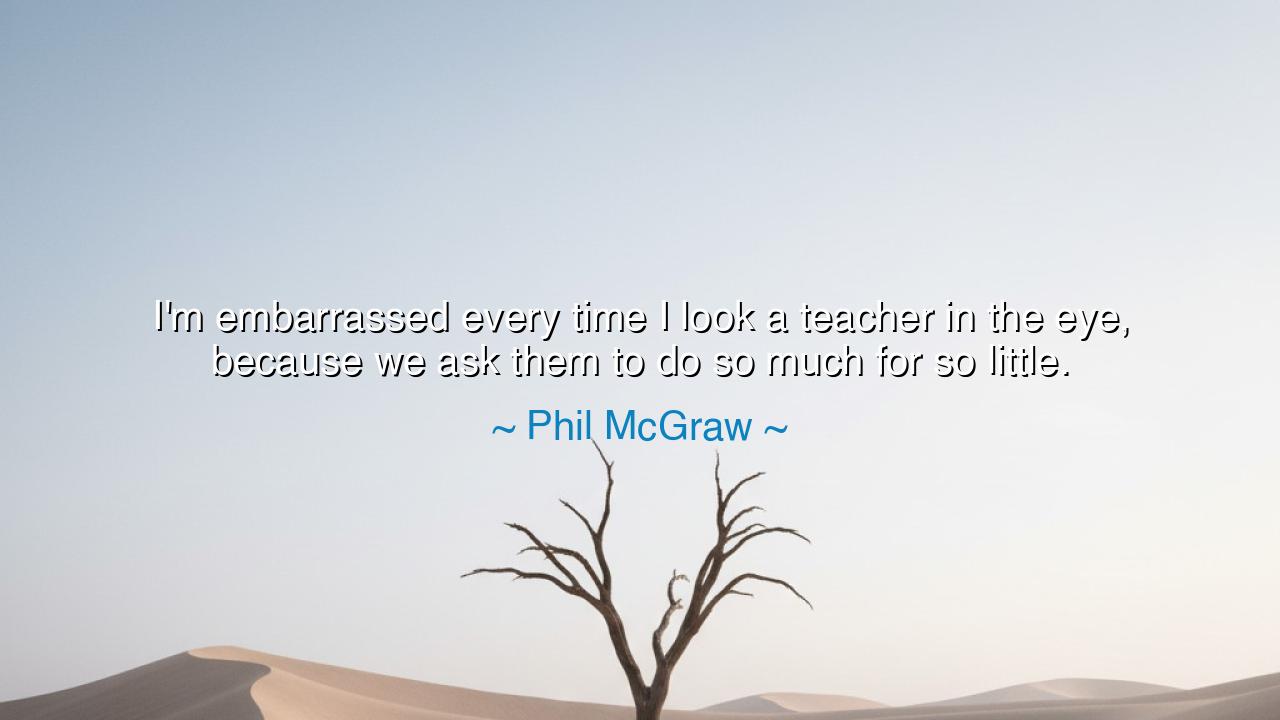
I'm embarrassed every time I look a teacher in the eye, because
I'm embarrassed every time I look a teacher in the eye, because we ask them to do so much for so little.






Hearken, children of the ages, and heed the words of Phil McGraw, who spoke with a heart heavy with respect and sorrow: "I'm embarrassed every time I look a teacher in the eye, because we ask them to do so much for so little." Here lies a solemn reflection upon the sacred labor of those who guide the minds and spirits of the young. Teachers bear the weight of society’s hopes, expectations, and futures, yet their recompense is often meager compared to the magnitude of their duty. McGraw calls our attention to the imbalance, to the quiet sacrifices, and to the debt of gratitude owed to these stewards of knowledge and virtue.
The teacher is both guide and guardian, shaping not only intellect but character, resilience, and moral vision. Every lesson, every word of encouragement, every act of patience is a thread in the vast tapestry of human potential. And yet, McGraw reminds us that society often undervalues their labor, asking for devotion, wisdom, and endurance far beyond what is fairly compensated. To behold a teacher is to behold a force of nature, quietly sustaining generations while carrying burdens unseen.
Consider the story of Anne Sullivan, the devoted teacher of Helen Keller. Sullivan’s sacrifices were immense: her labor long, her resources scant, her challenges unceasing. She poured her life into guiding Keller through darkness and silence, illuminating the path of learning and expression. For such sacrificial dedication, few could provide proper reward or recognition. Yet Sullivan endured, driven by the sacred conviction of teaching as service to humanity, embodying precisely what McGraw venerates—the extraordinary demands placed upon those who nurture minds for the benefit of others.
McGraw’s words also illuminate the moral dimension of teaching: it is not a profession of mere skill, but of heart, patience, and courage. Teachers encounter indifference, resistance, and fatigue, yet continue their work because of a higher calling. They are charged with molding the future while receiving but a fraction of the respect and compensation their labor merits. In this, the quote becomes a mirror, reflecting both our societal obligations and our personal duty to honor those who shape the minds of tomorrow.
Historically, we see this in the lives of educators across ages and cultures. Maria Montessori, who revolutionized early childhood education, devoted herself to developing methods that transformed countless lives, often working under conditions of hardship. Her sacrifice and dedication exemplify the truth in McGraw’s statement: teachers are asked to accomplish miracles daily, often with resources and recognition far below the magnitude of their contributions.
The lesson is clear: let us recognize the true value of the teacher, not only in words of gratitude, but in actions of support, respect, and tangible reward. To undervalue their work is to undermine the very foundation upon which society rests—the cultivation of knowledge, virtue, and human potential. Teachers deserve our esteem, our patience, and our unwavering acknowledgment of their central role in shaping the future.
Practical action flows naturally: honor teachers in daily life, advocate for fair compensation, provide resources to lighten their burdens, and offer encouragement that acknowledges both their effort and sacrifice. Look upon those who teach with reverence, understanding that their labor is not merely employment, but a sacred service to the generations that follow.
Thus, Phil McGraw’s words endure as both admonition and inspiration: the teacher bears a sacred weight, often underappreciated, yet steadfast in their service. Let us meet their gaze with humility, gratitude, and commitment to justice, ensuring that their labor is met not with embarrassment, but with honor, support, and recognition worthy of their immeasurable contribution.
If you wish, I can also craft a poetic, audio-ready version of this passage, where the rhythm mirrors the reverent weight and quiet dignity of the teacher’s labor, enhancing the emotional and reflective impact of McGraw’s insight. Do you want me to do that?






AAdministratorAdministrator
Welcome, honored guests. Please leave a comment, we will respond soon